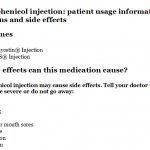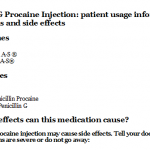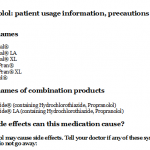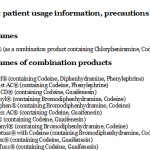
Tranylcypromine: patient usage information, precautions and side effects
Tuesday, May 30, 2017 by Gregory Van Dyke
http://www.naturalnewsreference.com/2017-05-30-tranylcypromine-patient-usage-information-precautions-and-side-effects.html
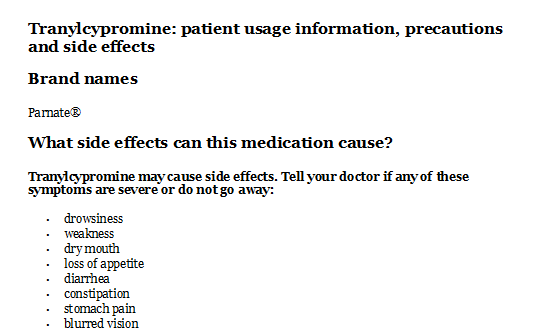
Tranylcypromine: patient usage information, precautions and side effects
Brand names
Parnate®
What side effects can this medication cause?
Tranylcypromine may cause side effects. Tell your doctor if any of these symptoms are severe or do not go away:
- drowsiness
- weakness
- dry mouth
- loss of appetite
- diarrhea
- constipation
- stomach pain
- blurred vision
- chills
- ringing in the ears
- muscle tightening or jerking
- uncontrollable shaking of any part of the body
- numbness, burning, or tingling in the arms or legs
- difficulty urinating
- decreased sexual ability
- hair loss
- rash
Some side effects can be serious. If you experience any of the following symptoms or those listed in the IMPORTANT WARNING section, call your doctor immediately:
- headache
- slow, fast, or pounding heartbeat
- chest pain or tightness
- tightening of the throat
- nausea
- sweating
- fever
- cold, clammy skin
- dizziness
- neck stiffness or soreness
- sensitivity to light
- widened pupils (black circles in the middle of the eyes)
- swelling of arms, hands, feet, ankles, or lower legs
- unusual bleeding or bruising
- pain in the upper right part of the stomach
- flu-like symptoms
- yellowing of the skin or eyes
Tranylcypromine may cause other side effects. Call your doctor if you have any unusual problems while you are taking this medication.
If you experience a serious side effect, you or your doctor may send a report to the Food and Drug Administration’s (FDA) MedWatch Adverse Event Reporting program online (http://www.fda.gov/Safety/MedWatch) or by phone (1-800-332-1088).
IMPORTANT WARNING:
A small number of children, teenagers, and young adults (up to 24 years of age) who took antidepressants (‘mood elevators’) such as tranylcypromine during clinical studies became suicidal (thinking about harming or killing oneself or planning or trying to do so). Children, teenagers, and young adults who take antidepressants to treat depression or other mental illnesses may be more likely to become suicidal than children, teenagers, and young adults who do not take antidepressants to treat these conditions. However, experts are not sure about how great this risk is and how much it should be considered in deciding whether a child or teenager should take an antidepressant. Children younger than 18 years of age should not normally take tranylcypromine, but in some cases, a doctor may decide that tranylcypromine is the best medication to treat a child’s condition.
You should know that your mental health may change in unexpected ways when you take tranylcypromine or other antidepressants even if you are an adult over age 24. You may become suicidal, especially at the beginning of your treatment and any time that your dose is increased or decreased. You, your family, or your caregiver should call your doctor right away if you experience any of the following symptoms: new or worsening depression; thinking about harming or killing yourself, or planning or trying to do so; extreme worry; agitation; panic attacks; difficulty falling asleep or staying asleep; aggressive behavior; irritability; acting without thinking; severe restlessness; and frenzied abnormal excitement. Be sure that your family or caregiver knows which symptoms may be serious so they can call the doctor when you are unable to seek treatment on your own.
Your healthcare provider will want to see you often while you are taking tranylcypromine, especially at the beginning of your treatment. Be sure to keep all appointments for office visits with your doctor.
The doctor or pharmacist will give you the manufacturer’s patient information sheet (Medication Guide) when you begin treatment with tranylcypromine. Read the information carefully and ask your doctor or pharmacist if you have any questions. You also can obtain the Medication Guide from the FDA website: http://www.fda.gov/Drugs/DrugSafety/InformationbyDrugClass/UCM096273.
No matter what your age, before you take an antidepressant, you, your parent, or your caregiver should talk to your doctor about the risks and benefits of treating your condition with an antidepressant or with other treatments. You should also talk about the risks and benefits of not treating your condition. You should know that having depression or another mental illness greatly increases the risk that you will become suicidal. This risk is higher if you or anyone in your family has or has ever had bipolar disorder (mood that changes from depressed to abnormally excited) or mania (frenzied, abnormally excited mood) or has thought about or attempted suicide. Talk to your doctor about your condition, symptoms, and personal and family medical history. You and your doctor will decide what type of treatment is right for you.
Why is this medication prescribed?
Tranylcypromine is used to treat depression in people who have not been helped by other medications. Tranylcypromine is in a class of medications called monoamine oxidase inhibitors (MAOIs). It works by increasing the amounts of certain natural substances that are needed to maintain mental balance.
How should this medicine be used?
Tranylcypromine comes as a tablet to take by mouth. It is usually taken twice a day. Take tranylcypromine at around the same times every day. Follow the directions on your prescription label carefully, and ask your doctor or pharmacist to explain any part you do not understand. Take tranylcypromine exactly as directed.
Tranylcypromine may be habit-forming. Do not take a larger dose, take it more often, or take it for a longer period of time than prescribed by your doctor. Call your doctor if you find that you want to take extra medication or you notice any other unusual changes in your behavior or mood.
Your doctor will probably start you on a low dose of tranylcypromine and gradually increase your dose, not more often than once every 1-3 weeks. After your symptoms improve, your doctor will probably gradually decrease your dose of tranylcypromine.
Tranylcypromine controls the symptoms of depression but does not cure the condition. It may take 3 weeks or longer for you to feel the full benefit of tranylcypromine. Continue to take tranylcypromine even if you feel well. Do not stop taking tranylcypromine without talking to your doctor. Your doctor will probably want to decrease your dose gradually.
Other uses for this medicine
This medication is sometimes prescribed for other uses; ask your doctor or pharmacist for more information.
What special precautions should I follow?
Before taking tranylcypromine,
- tell your doctor and pharmacist if you are allergic to tranylcypromine or any other medications.
- tell your doctor if you are taking, you have recently taken, or you plan to take any of the following prescription or non-prescription medications: certain other antidepressants including amitriptyline (Elavil), amoxapine, clomipramine (Anafranil), desipramine (Norpramin), doxepin (Sinequan), imipramine (Tofranil), maprotiline, nortriptyline (Pamelor), protriptyline (Vivactil), and trimipramine (Surmontil); amphetamines such as amphetamine (in Adderall), benzphetamine (Didrex), dextroamphetamine (Dexedrine, Dextrostat, in Adderall), and methamphetamine (Desoxyn); bupropion (Wellbutrin, Zyban); buspirone (BuSpar); caffeine (No-Doz, Quick-Pep, Vivarin); cyclobenzaprine (Flexeril); dexfenfluramine (Redux) (not available in the U.S.); dextromethorphan (Robitussin, others); diuretics (‘water pills’); levodopa (Larodopa, in Sinemet);medications for allergies,cough and cold symptoms, and hay fever;medications for high blood pressure such as guanethidine (Ismelin) (not available in the U.S.), methyldopa (Aldomet), and reserpine (Serpalan);medications for Parkinson’s disease, anxiety, or weight loss (diet pills); medications for seizures such as carbamazepine (Tegretol); narcotic medications for pain; other MAOIs such as isocarboxazid (Marplan); pargyline (not available in the U.S.), phenelzine (Nardil), procarbazine (Matulane), and selegiline (Eldepryl); meperidine (Demerol); sedatives; selective serotonin reuptake inhibitors such as citalopram (Celexa), duloxetine (Cymbalta), escitalopram (Lexapro), fluoxetine (Prozac), fluvoxamine (Luvox), paroxetine (Paxil), and sertraline (Zoloft);sleeping pills; tranquilizers; and medications containing alcohol (Nyquil, elixirs, others). Your doctor may tell you not to take tranylcypromine if you are taking or have recently stopped taking one or more of these medications.
- tell your doctor and pharmacist what other prescription and nonprescription medications, vitamins, and herbal products you are taking or plan to take. Be sure to mention any of the following: disulfiram (Antabuse), doxepin cream (Zonalon), insulin and oral medications for diabetes, and medications for nausea or mental illness. Your doctor may need to change the doses of your medications or monitor you carefully for side effects.
- you should know that tranylcypromine may remain in your body for several weeks after you stop taking the medication. During the first few weeks after your treatment ends, tell your doctor and pharmacist that you have recently stopped taking tranylcypromine before you start taking any new medications.
- tell your doctor if you are taking any nutritional supplements, especially tryptophan.
- tell your doctor if you have or have ever had high blood pressure; frequent or severe headaches; pheochromocytoma (a tumor on a small gland near the kidneys);a stroke or mini-stroke; or heart, blood vessel, or liver disease. Your doctor may tell you not to take tranylcypromine.
- tell your doctor if you use or have ever used street drugs or have overused prescription medications. Tell your doctor if you have or have ever had anxiety, agitation, diabetes, seizures, or kidney or thyroid disease.
- tell your doctor if you are pregnant, plan to become pregnant, or are breast-feeding. If you become pregnant while taking tranylcypromine, call your doctor.
- if you are having surgery, including dental surgery, or any x-ray procedure, tell the doctor or dentist that you are taking tranylcypromine.
- you should know that this medication may make you drowsy. Do not drive a car or operate machinery until you know how this medication affects you.
- remember that alcohol can add to the drowsiness caused by this medication. Do not drink alcohol while you are taking tranylcypromine.
- you should know that tranylcypromine may cause dizziness, lightheadedness, and fainting when you get up too quickly from a lying position. This is more common when you first start taking tranylcypromine. To avoid this problem, get out of bed slowly, resting your feet on the floor for a few minutes before standing up.
- What special dietary instructions should I follow?
- You may experience a serious reaction if you eat foods that are high in tyramine during your treatment with tranylcypromine. Tyramine is found in many foods, including meat, poultry, fish, or cheese that has been smoked, aged, improperly stored, or spoiled; certain fruits, vegetables, and beans; alcoholic beverages; and yeast products that have fermented. Your doctor or dietitian will tell you which foods you must avoid completely, and which foods you may eat in small amounts. You should also avoid foods and drinks that contain caffeine during your treatment with tranylcypromine. Follow these directions carefully. Ask your doctor or dietitian if you have any questions about what you may eat and drink during your treatment.
What should I do if I forget a dose?
Take the missed dose as soon as you remember it. However, if it is almost time for your next dose, skip the missed dose and continue your regular dosing schedule. Do not take a double dose to make up for a missed one.
What should I know about storage and disposal of this medication?
Keep this medication in the container it came in, tightly closed, and out of reach of children. Store it at room temperature and away from excess heat and moisture (not in the bathroom). Throw away any medication that is outdated or no longer needed. Talk to your pharmacist about the proper disposal of your medication.
In case of emergency/overdose
In case of overdose, call your local poison control center at 1-800-222-1222. If the victim has collapsed or is not breathing, call local emergency services at 911.
Symptoms of overdose may include:
- difficulty falling asleep or staying asleep
- restlessness
- anxiety
- agitation
- confusion
- unclear speech
- dizziness
- weakness
- drowsiness
- headache
- muscle twitching
- fever
- stiffness
- coma (loss of consciousness for a period of time)
What other information should I know?
Keep all appointments with your doctor. Your doctor will check your blood pressure often during your treatment with tranylcypromine.
Do not let anyone else take your medication. Ask your pharmacist any questions you have about refilling your prescription.
It is important for you to keep a written list of all of the prescription and nonprescription (over-the-counter) medicines you are taking, as well as any products such as vitamins, minerals, or other dietary supplements. You should bring this list with you each time you visit a doctor or if you are admitted to a hospital. It is also important information to carry with you in case of emergencies.
Why is this medication prescribed?
How should this medicine be used?
What special precautions should I follow?
What special dietary instructions should I follow?
What should I do if I forget a dose?
What side effects can this medication cause?
What should I know about storage and disposal of this medication?
Tagged Under: Tags: chemical medicine, medication, Pharma, Prescription Medicine

